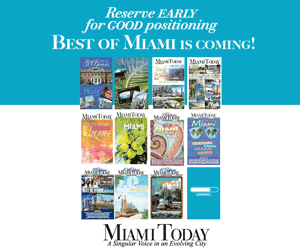Council Of The Americas Challenging Miamis Gateway Moniker
By Lou Ortiz
The Council of the Americas will host a trade conference in Central America this week, touting Panama City in the region as "A Gateway of the Americas."
Sound familiar? Miami for years has been known as "the Gateway to the Americas," because of its geographic location, the multi-billion dollar trade industry with Latin America, and the free trade agreements between the United States and the Americas, among other things.
"Panama can’t compete with us," said Brian Dean, president of Gateway Florida, formerly the Free Trade Area of the Americas, an organization established by the State of Florida to help bring the headquarters of the Free Trade Area of the Americas to the state. In its new incarnation, the organization promotes free trade policy in the hemisphere.
"Miami will remain as the gateway," Mr. Dean said.
But there’s no doubt that Panama is trying to siphon-off business. Council officials expect at least 200 people — from government officials to business representatives — to attend the Panama City conference on Feb. 29, with such sponsors as FedEx, Merrill Lynch and Wal-Mart.
The conference will raise investment opportunities and the infrastructure, technology and competitiveness in Panama.
Panama President Martin Torrijos is expected to address the conference and a host of other top Panamanian government officials are to attend, including the country’s ministers of Economy and Finance, and Industry and Commerce.
Panama promotes itself as an international banking center with 120 banks from 35 countries, a $12 billion commercial hub and transport center with more than 1,700 merchants because of the Panama Canal and the Colon Free Zone, the largest in the Western hemisphere, according to the country’s Web site.
More than 14,000 cargo vessels pass through the 50-mile canal annually. The $5.3 billion canal expansion, which will accommodate sea transport ships carrying 10,000 containers versus the present 4,000 containers, will be completed sometime between 2014 and 2015.
According to a Beacon Council report in January, nearly 1,200 multinational companies are in South Florida, and 232 of the firms have global headquarters based in the area.
The study found that there were 27 companies from Canada, 116 from Latin America and the Caribbean, and 76 from Asia, according to the Beacon Council, Miami-Dade’s public-private economic development partnership.
Europe accounted for 305 companies.
In South Florida, there are 55 foreign banks with assets totaling $41.8 billion.
"Miami as a gateway doesn’t go unchallenged," said economist Manny Lasaga. "Panama has always been a [trade] hub historically. At one time it was an important airline hub for the Americas, but not anymore."
Mr. Lasaga said Panama’s location makes it a natural hub for trade, along with its assets in banking and language.
"We’re still the leading hub for Latin America," he said. "We need to see what they [Panama] are doing to make our strategies more effective and not lose trade to Panama."
Mr. Dean said Panama cannot complete with the Miami area and South Florida in terms of infrastructure, banking, mediation for trade and telecommunications.
"We have pool of talent in Florida that is multi-lingual," he said. "Miami is meeting the challenge." Advertisement
Related Articles
- Enterprise Florida makes grants to 80 Miami-Dade firms
- Manny Mencia: Trade veteran heads board of World…
- Bahrain looks to Miami business, PortMiami accord
- Miami team assembles to host Summit of the Americas
- Two missions to Dubai on Enterprise Florida schedule
- TJ Villamil: Leads Florida’s international trade and…
- Portugal seeks trade and PortMiami agreement
- Countywide zone pushed to spark foreign trade
- Japan Airlines link to Miami on runway, takeoff may be late
- Miami desperately needs top-level community goals-setting
Most Popular
- Miami International Airport moving to add new concourse, gates
- Apple office hub becomes year’s biggest deal
- Miami administration building at Freedom Park wins OK
- Spaceport status OK’d for Homestead Air Reserve Base
- Miami Worldcenter to get 53-story condos-and-hotel tower
- Fleischer Studios for fabled cartoons may be labeled historic
- Tri-Rail chugging toward tri-county express trips
- Tri-Rail chugging toward tri-county express trips
- Awaited ultra-luxury office tower 830 Brickell vows 2024 finish
- Miami needs $5 billion to fight flooding






Recent Comments